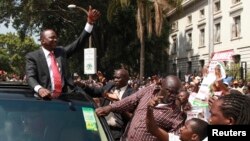NAIROBI —
Kenya’s High Court has cleared the way for presidential candidate Uhuru Kenyatta and his running mate, William Ruto, to run in the country's presidential election on March 4 despite the fact both men face charges of crimes against humanity filed by the International Criminal Court (ICC).
Kenya's High Court has dismissed a petition filed by five non-governmental organizations (NGOs) seeking to block presidential hopeful Kenyatta and his running mate from taking part in the election. The men are charged by the ICC with crimes committeed during inter-tribal fighting that swept across Kenya in early 2008 following the disputed 2007 election. Their trial is due to begin on April 11 at the Hague.
Both men deny the ICC charges.
The Kenya High Court said it had no jurisdiction over the eligibility matter and said the petitioners should have first taken their case to the Independent Election Board.
Justice Mbogholi Msagha, reading the ruling, said the court lacks the authority to decide who is eligible to run for president. The matter lies with the Supreme Court to give the ruling, he said
“We were urged to make a declaration whose ultimate aim will result in the determination of a question whether the third and fourth respondents are qualified to offer their candidature to the office of the president or deputy president respectively. This is an issue which is within the exclusive jurisdiction of the Supreme Court,” said Msagha.
Kenyatta and his running mate, parliament member William Ruto, are accused of crimes against humanity in connection to violence after the 2007 election in which over 1,100 people were killed and more than 600,000 people were displaced.
Recent opinion polls concerning the March 4 election in Kenya show Kenyatta running a close second to Prime Minister Raila Odina in the race for president.
This High Court ruling might be a victory for the Jubilee coalition led by Kenyatta, and William Ruto, and its supporters, but many Kenyans are worried of possible political and financial consequences their country will face if the two men win election while at the same time facing international charges of crimes against humanity.
In her visit to Kenya last year, ICC prosecutor Fatou Bensouda emphasized that the country's political future is in the hands of its electorate but said the ICC judicial process will take its own course.
Kenya's High Court has dismissed a petition filed by five non-governmental organizations (NGOs) seeking to block presidential hopeful Kenyatta and his running mate from taking part in the election. The men are charged by the ICC with crimes committeed during inter-tribal fighting that swept across Kenya in early 2008 following the disputed 2007 election. Their trial is due to begin on April 11 at the Hague.
Both men deny the ICC charges.
The Kenya High Court said it had no jurisdiction over the eligibility matter and said the petitioners should have first taken their case to the Independent Election Board.
Justice Mbogholi Msagha, reading the ruling, said the court lacks the authority to decide who is eligible to run for president. The matter lies with the Supreme Court to give the ruling, he said
“We were urged to make a declaration whose ultimate aim will result in the determination of a question whether the third and fourth respondents are qualified to offer their candidature to the office of the president or deputy president respectively. This is an issue which is within the exclusive jurisdiction of the Supreme Court,” said Msagha.
Kenyatta and his running mate, parliament member William Ruto, are accused of crimes against humanity in connection to violence after the 2007 election in which over 1,100 people were killed and more than 600,000 people were displaced.
Recent opinion polls concerning the March 4 election in Kenya show Kenyatta running a close second to Prime Minister Raila Odina in the race for president.
This High Court ruling might be a victory for the Jubilee coalition led by Kenyatta, and William Ruto, and its supporters, but many Kenyans are worried of possible political and financial consequences their country will face if the two men win election while at the same time facing international charges of crimes against humanity.
In her visit to Kenya last year, ICC prosecutor Fatou Bensouda emphasized that the country's political future is in the hands of its electorate but said the ICC judicial process will take its own course.




